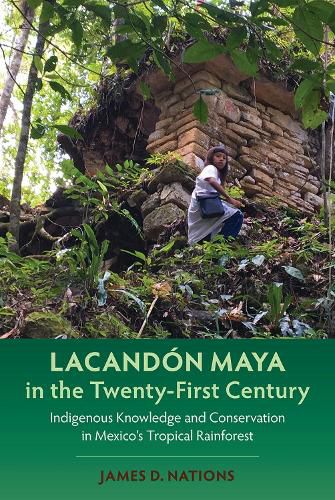Readings Newsletter
Become a Readings Member to make your shopping experience even easier.
Sign in or sign up for free!
You’re not far away from qualifying for FREE standard shipping within Australia
You’ve qualified for FREE standard shipping within Australia
The cart is loading…






This title is printed to order. This book may have been self-published. If so, we cannot guarantee the quality of the content. In the main most books will have gone through the editing process however some may not. We therefore suggest that you be aware of this before ordering this book. If in doubt check either the author or publisher’s details as we are unable to accept any returns unless they are faulty. Please contact us if you have any questions.
From the ancient traditions of the Lacandon Maya comes an Indigenous model for a sustainable future.
Having lived for centuries isolated within Mexico's largest remaining tropical rainforest, the Indigenous Lacandon Maya now live at the nexus of two worlds-ancient and modern. While previous research has focused on documenting Lacandon oral traditions and religious practices in order to preserve them, this book tells the story of how Lacandon families have adapted to the contemporary world while applying their ancestral knowledge to create an ecologically sustainable future.
Drawing on his 49 years of studying and learning from the Lacandon Maya, James Nations discusses how in the midst of external pressures such as technological changes, missionary influences, and logging ventures, Lacandon communities are building an economic system of agroforestry and ecotourism that produces income for their families while protecting biodiversity and cultural resources. Nations describes methods they use to plant and harvest without harming the forest, illustrating that despite drastic changes in lifestyle, respect for the environment continues to connect Lacandon families across generations. By helping with these tasks and inheriting the fables and myths that reinforce this worldview, Lacandon children continue to learn about the plants, animals, and spiritual deities that coexist in their land.
Indigenous peoples such as the Lacandon Maya control one-third of the intact forest landscapes left on Earth, and Indigenous knowledge and practices are increasingly recognized as key elements in the survival of the planet's biological diversity. The story of the Lacandon Maya serves as a model for Indigenous controlled environmental conservation, and it will inform anyone interested in supporting sustainable Indigenous futures.
A volume in the series Maya Studies, edited by Diane Z. Chase and Arlen F. Chase
$9.00 standard shipping within Australia
FREE standard shipping within Australia for orders over $100.00
Express & International shipping calculated at checkout
This title is printed to order. This book may have been self-published. If so, we cannot guarantee the quality of the content. In the main most books will have gone through the editing process however some may not. We therefore suggest that you be aware of this before ordering this book. If in doubt check either the author or publisher’s details as we are unable to accept any returns unless they are faulty. Please contact us if you have any questions.
From the ancient traditions of the Lacandon Maya comes an Indigenous model for a sustainable future.
Having lived for centuries isolated within Mexico's largest remaining tropical rainforest, the Indigenous Lacandon Maya now live at the nexus of two worlds-ancient and modern. While previous research has focused on documenting Lacandon oral traditions and religious practices in order to preserve them, this book tells the story of how Lacandon families have adapted to the contemporary world while applying their ancestral knowledge to create an ecologically sustainable future.
Drawing on his 49 years of studying and learning from the Lacandon Maya, James Nations discusses how in the midst of external pressures such as technological changes, missionary influences, and logging ventures, Lacandon communities are building an economic system of agroforestry and ecotourism that produces income for their families while protecting biodiversity and cultural resources. Nations describes methods they use to plant and harvest without harming the forest, illustrating that despite drastic changes in lifestyle, respect for the environment continues to connect Lacandon families across generations. By helping with these tasks and inheriting the fables and myths that reinforce this worldview, Lacandon children continue to learn about the plants, animals, and spiritual deities that coexist in their land.
Indigenous peoples such as the Lacandon Maya control one-third of the intact forest landscapes left on Earth, and Indigenous knowledge and practices are increasingly recognized as key elements in the survival of the planet's biological diversity. The story of the Lacandon Maya serves as a model for Indigenous controlled environmental conservation, and it will inform anyone interested in supporting sustainable Indigenous futures.
A volume in the series Maya Studies, edited by Diane Z. Chase and Arlen F. Chase